Maharaj Sawan Singh Charitable Hospital, Beas
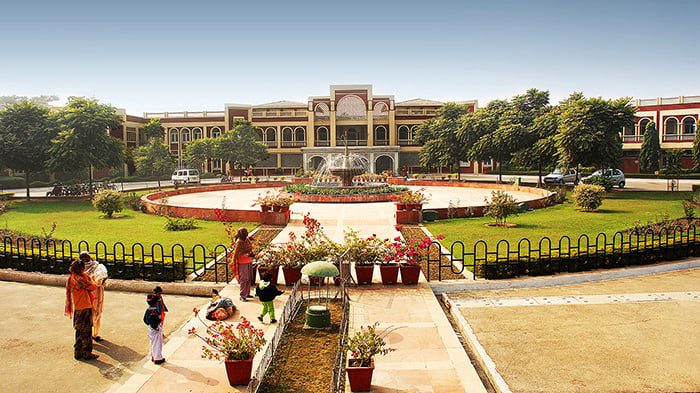 Maharaj Sawan Singh Charitable Hospital, Beas
Maharaj Sawan Singh Charitable Hospital, Beas
The Maharaj Sawan Singh Charitable Hospital is a 300-bed hospital located on thirty-five acres of land, situated on the Grand Trunk Road, midway between Amritsar and Jalandhar. The hospital was commissioned on 24th January 1986.
The hospital was set up primarily to meet the needs of the rural population in the vicinity of Beas, where adequate medical facilities were not available. Even for common ailments, people had to travel to Jalandhar or Amritsar. Medical care in these large cities was becoming more and more expensive and generally beyond the means of the poor.
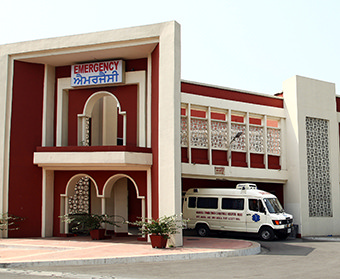
Services are provided to those living within a 25-kilometre radius of Beas, in 649 villages and towns with a total estimated population of about 1.8 million people. Emergency services, including two ambulances, are provided to all without restriction. The Beas hospital also functions as a referral hospital for the nearby Dera hospital, located eight kilometres away at Dera Baba Jaimal Singh.
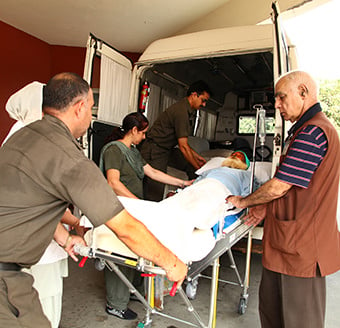 Ambulance and Emergency services, Beas
Ambulance and Emergency services, Beas
Organization
The hospital has a team of over 50 doctors of various specialties and over 180 nursing and technical staff. A full-time Director supervises medical services. Supporting the medical unit is a committed team of nearly 400 administrative and support personnel of various types and professional backgrounds. The Chief Administrator who is the overall head of the Beas hospital is also Chief Administrator of the hospitals in Sikanderpur, Bhota, and Dera.
Services provided
All medical and surgical services that are generally available in a district level hospital are provided in this facility. Over 300,000 outpatients and 11,000 inpatients are served annually, and provided with all basic facilities, e.g., laboratory tests, X-rays, CT Scans, blood bank, ultrasound and colour doppler, echocardiography, and electrocardiogram, as well as medicines and food. Tertiary-level specialty care is not provided here; where needed, patients are referred to appropriate institutions elsewhere.
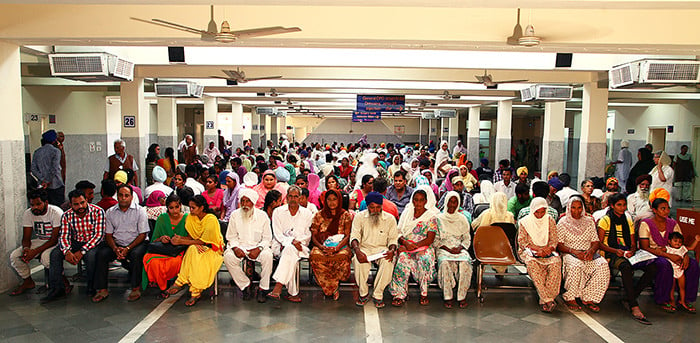 Outpatient Department (OPD), Beas
Outpatient Department (OPD), Beas
Medical Services
The hospital provides Intensive Care, Critical Care and Emergency Services around the clock. Also available are facilities to assess cardiac status through stress tests and echocardiography as well as pulmonary functions. The hospital provides neonatal care services to attend to the needs of newborn babies. It also has a dental clinic with an experienced dentist, and a physiotherapy department staffed by three qualified physiotherapists.
%20_%20web_700x432.jpg) Critical Care Unit (CCU), Beas
Critical Care Unit (CCU), Beas
Surgical Services
A surgical team performs general surgery, and specialized surgery in the areas of orthopedics, ophthalmology, ENT, obstetrics and gynecology. The hospital has seven well-equipped major operating theatres. Abdominal surgeries by laparoscope, cataract extraction by phaco machine, and ENT operations by endoscope are routinely performed. A team of anesthetists provides support for all surgical work.
All the operating theatres are air-conditioned and conform to standard norms of sterilization, prevention of infection and staff comfort, supported by the Central Sterile Services Department.
%20_%20web_340x227.jpg) Intensive Care Unit (ICU), Beas
Intensive Care Unit (ICU), Beas
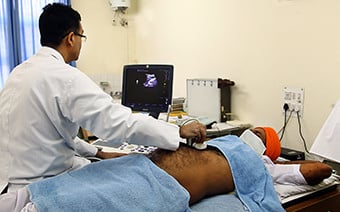 Ultrasound, Beas
Ultrasound, Beas
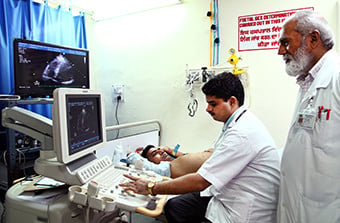 Echocardiography, Beas
Echocardiography, Beas
Other Services
Laboratory and Blood Bank:
The hospital has a well-equipped laboratory providing services for hematology, biochemistry, microbiology, serology, clinical pathology and histopathology. The Blood Bank is approved by the National AIDS Control Organization.
Pharmacy: There is a central pharmacy that stocks drugs of standard manufacturers for all the hospitals, including the Bhota and Sikanderpur hospitals. The Beas hospital pharmacy supplies medicines to the wards and OPD pharmacy at Beas. Free medicines are given to outpatients.
Support Services: Two ambulances with basic facilities are available to transport patients to referral institutions. Three generators can supply power for the total needs of the hospital. A boiler, centralized medical gas supply unit, laundry, and the like are also in use. A professionally managed kitchen caters to various inpatient diets. There is in-house backup for electronics, mechanical, electrical, air-conditioning and civil engineering.
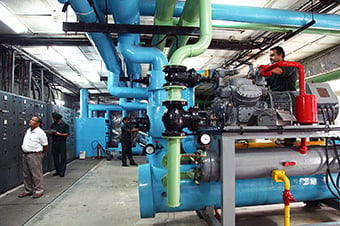 Central air conditioning unit, Beas
Central air conditioning unit, Beas
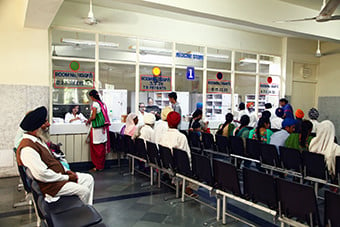 Outpatient Department Pharmacy, Beas
Outpatient Department Pharmacy, Beas